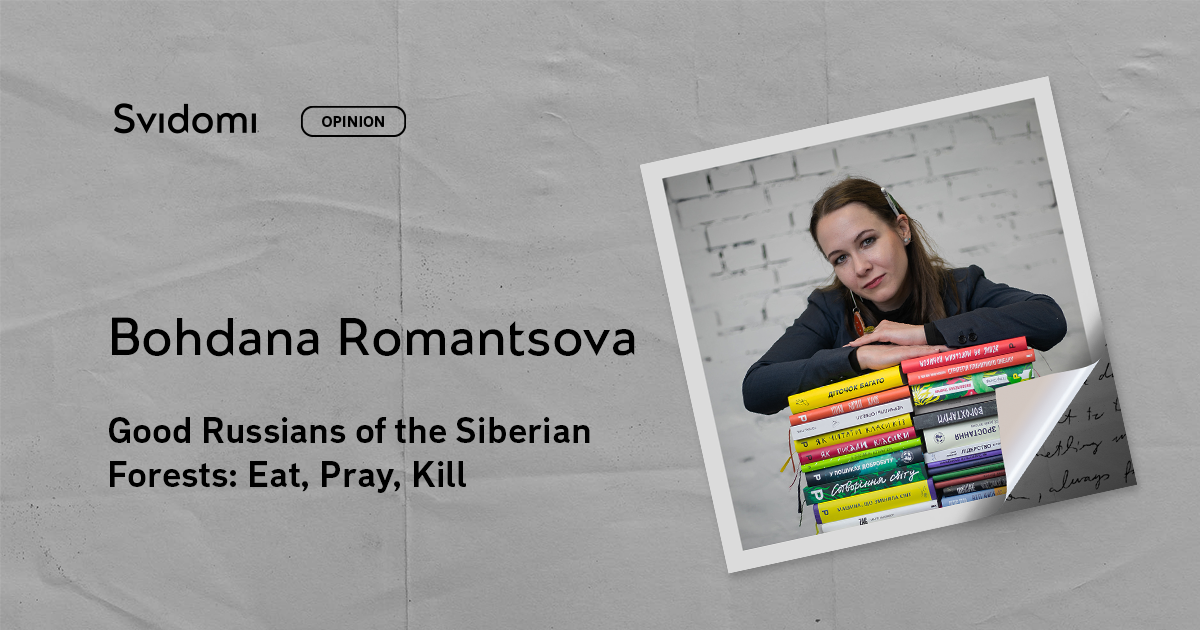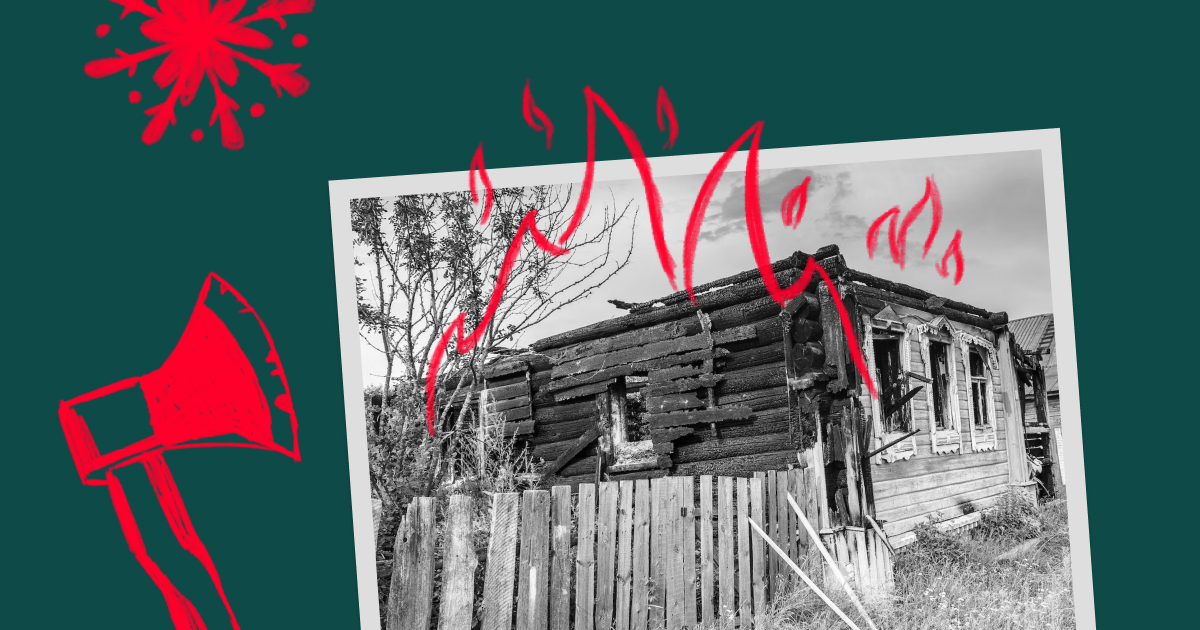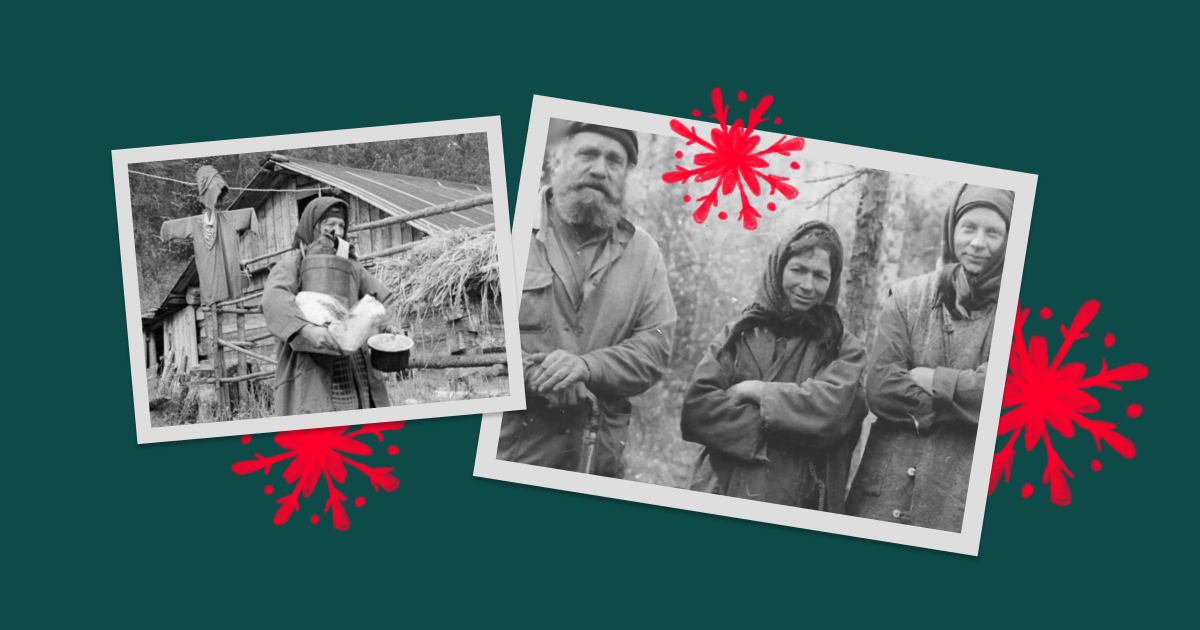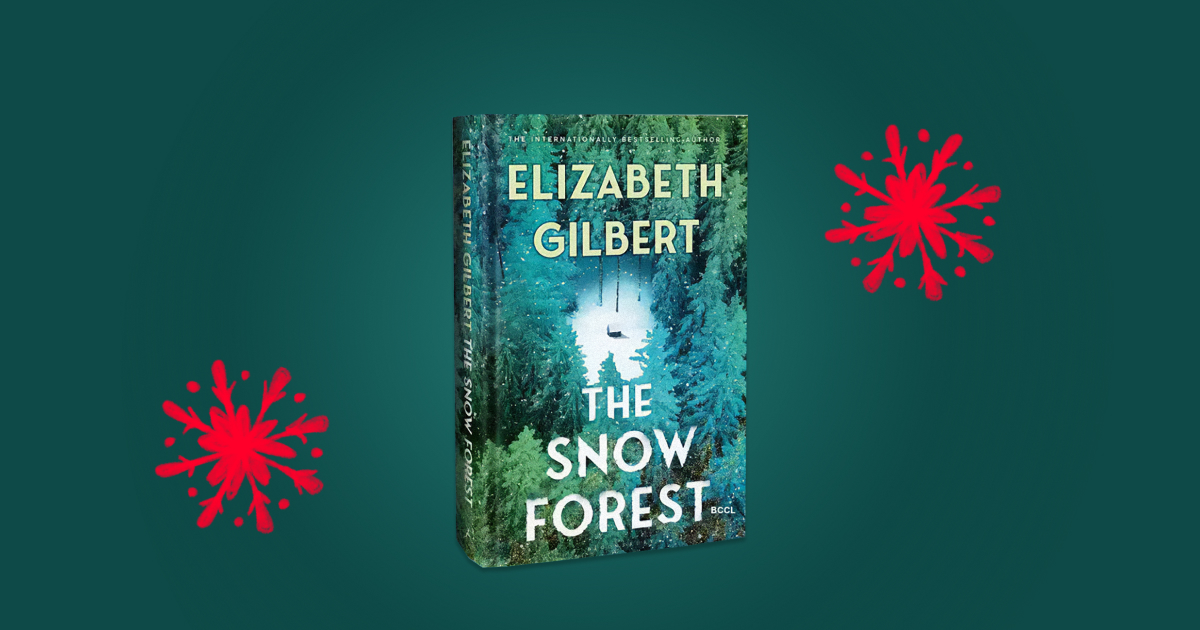Good Russians of the Siberian Forests: Eat, Pray, Kill
Bohdana Romantsova

Whenever I receive an invitation from a foreign cultural foundation, media outlet, or institution to come to a programme, participate in a discussion, or speak about Ukrainian book publishing or culture during the war, I write a letter of thanks. And after the courtesy has been maintained, I ask the same question: Will the Russians be there? I seem to repeat this phrase so often that I no longer need to translate but rather transliterate it. It's a recognisable formula, a constant place, like topos in medieval manuscripts. Only this question is not rhetorical, and I am ready to accept the offer only after a categorical "no, no Russians".
I attended a programme the Flemish Cultural Foundation organised in Flanders in early June. Explaining my categorical position to the organisers, during the first evening, I began to talk about the numerous bans, oppression and how Russian culture has been legitimising its aggressive policy in the eyes of the world for centuries. To which Diego, one of the programme organisers, replied: "No problem, we understand you perfectly, as the Flemish literature is also often forced to fight for its place among great imperial traditions.” If the Flemish understand, why do the French, Germans, or even Americans often fail to do so? I think the point is in the level of reconsideration and awareness of one's tradition as imperial or, conversely, influenced by the empire. Finally, in the reader's optics, which should always be "wiped".
To separate Russian culture, Russian ideas, and imperial, expansive politics is obviously naïve and short-sighted, and we already know this. But what's the harm in novels about good Russian fighters for freedom and against all that is bad, or even escapist novels written by Americans or French? Why did Elizabeth Gilbert have to abandon the idea of publishing The Snow Forest, a novel about a family of hermits in the Siberian forests?
Oh, I have answers for you. And they are about the mythology that forms around each influential book, about the images that appear and are fixed in readers' minds. It is about highlighting a particular culture at a time when this culture is a powerful ideological tool of aggression.
Romanticising. This novel's first dangerous trend is the romanticisation of life in the Russian hinterland. We've all seen videos of Russians stealing toilets, wardrobes, alcohol - anything that can be taken out and sent home by post. Even cameras or baby monitors, which they see as decorative elements of the interior. That's why Ukrainians could watch the life of an ordinary Buryat family for a long time - no one prepared us for such reality shows, that's the truth.

The stories on Russian regional television that we laugh at are based on three pillars: a wooden toilet in the street in which someone tried to drown, a fire started by the firefighters themselves, and a package of dumplings/tickets to the circus brought to the family of a killed Russian instead of the promised compensation. It is the reality.
But, according to Gilbert and the book publishers, the novel is about living in the bosom of nature, about the desire to reject the benefits of civilisation not because they simply do not exist but to develop spiritually and resist the world's temptations. It's a mixture of Jon Krakauer's Into the Wild and Henry David Thoreau's Walden; or, Life in the Woods. These authors write about a new form of asceticism, reinterpreting the medieval idea of subduing the body for spiritual purity and unity with nature, romantically opposed to civilisation. I would like to add Panas Myrnyi's words: "The city has spoilt the girl".
Escapism and an attempt to slip away from the clutches of the consumerist, soulless world is an idea that recurs in various books by Elizabeth, including her most famous novel Eat, Pray, Love. Only this time, she is looking for a counterbalance to the capitalist Western world not in India but in the Siberian forests. I can logically explain this to myself: authors often choose an unknown, conditionally exotic territory for them and then try to see this world without the orientalist Western gaze, without imposing a net of Western values and concepts on foreign land, as Rudyard Kipling or Mein Reed did in their time.
Perhaps India seems to be a recurring theme for writers (from Gregory David Roberts' Shantaram to Arundhati Roy's novels), so Elizabeth looked for other options. But she made a mistake. Russian culture, even in the hinterland, is not an exotic alternative. It is either the culture of oppressed peoples or the same imperial vision that intellectuals from St. Petersburg or Moscow broadcast.
Disclaimer. Elizabeth conceived this novel during the pandemic and was inspired by the real-life family of Siberian hermits, the Lykovs. A little history to help explore the depths of the Russian soul. At the end of the nineteenth century, Old Believers, fleeing the sins of the big city, founded a small village called Tyshi. The Tyshi rejected the monetary system and returned to the natural exchange of fur and fish for "salt and iron". In 1929, when collectivisation reached Tyshi, the Old Believers moved upstream to the mouth of the Kair-Su River. In 1945, military surveyors found them, and it turned out that the residents had not even heard of World War II. Then the Lykov family changed their place of residence again, and for the third time, they were discovered by geologists in 1978.

A series of media publications followed, and the world learned about the family. It is not so much a new Robinsonian story as a story of typical residents of the world's largest country who deliberately separated themselves from the world, refused to participate in global political processes, sealed themselves off and focused on their little lives. A house on the edge, when the edge is so far away that only geologists can get there. Is isolation a sin for the Lykov family? Not at all; they had enough problems of their own: from domestic violence, tyranny, and refusal to educate their children to the murder of relatives and extreme forms of patriarchy.
But for me, there are obvious parallels with modern Russians who refuse to know what is happening in the world, position themselves as little people far from politics, isolate themselves and focus on family life. In other words, avoid responsibility in every way possible. So, once again, we have the label of a small person who chooses the most general ideas about the world.
Real Good Russians. The image of a natural, unspoilt person has been sung in literature since antiquity, if not earlier. It is Voltaire's The Sincere Huron, the Russian child, and even Huxley's John the Savage. "The Snowy Forest is not about one natural person but about a community of dissenters, whether in Siberia or the Falkland Islands, as in Huxley's Brave New World! If Russian liberals have discredited themselves, perhaps real Russians exist somewhere in the Siberian forests? Perhaps such heroes can help form a renewed, non-aggressive Russia that will fill the vast gap where Russia today stands? No, they cannot. Why?
For example, because there are cases when the prototypical heroes, the Tyshi, stopped feeding older people or "extra" children, and they died of hunger — this fits the concept of the cannibalistic Russia of today. This particular episode may not have found a place in Gilbert's novel. An isolated, hermetic community in books is almost always either a reduced model or an alternative to society.
Judging by the book's descriptions on bookstore websites, the novel is about idealisation, an alternative to a spoilt world. For example, the heroine, a linguist sent to investigate a hermit settlement, discovers a world in this "dangerous and beautiful wilderness" that is "even weirder and more wonderful than she could have expected." Ted Chiang's Story of Your Life and the whole associative series come to mind: don't impose your vision on others; appreciate diversity.
Territorial branding. Tours to the places of favourite novels, and constant pilgrimages to India, influenced by the books mentioned above, Shantaram and Eat, Pray, Love, are a surprisingly popular practice. Those tired of traditional London tours are taken to places Harry Potter visited. And in New Zealand, you will definitely be offered to see the hobbit huts. Literature is a powerful driver for regional tourism.
Promotional posts about Gilbert's new novel promise "the magnificent, magical extreme conditions of the Siberian taiga" and adventures in "untouched wilderness". This is almost a ready-made tourist brochure! Do we want our aggressive neighbour to make money from tourism? Obviously, no.

The Snowy Forest could be another line in a long polylogue about Russian culture. Its diversity, curiosity, and exoticism. It could have offered the European reader an image of a different Russian, unlike those who had staged the massacre in Bucha. Finally, it could have become a new Robinson-like adventure or even a territorial branding. Fortunately, it didn't, thanks to the activism of Ukrainian readers and also because Elizabeth Gilbert did listen to us.


